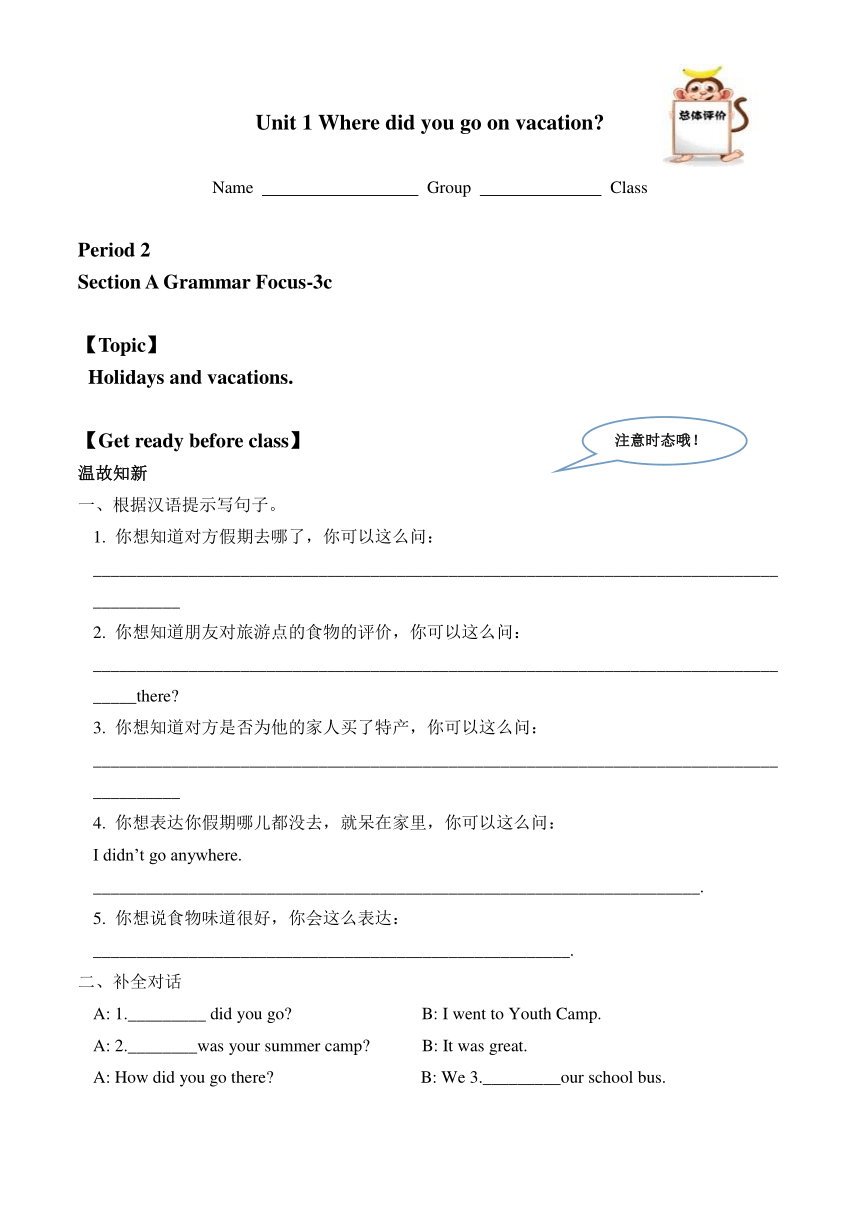人教版八年级上册 Unit 1 Where did you go on vacation?Section A 学案
文档属性
| 名称 | 人教版八年级上册 Unit 1 Where did you go on vacation?Section A 学案 |  | |
| 格式 | zip | ||
| 文件大小 | 50.0KB | ||
| 资源类型 | 教案 | ||
| 版本资源 | 人教新目标(Go for it)版 | ||
| 科目 | 英语 | ||
| 更新时间 | 2023-01-03 20:50:42 | ||
图片预览

文档简介
Unit 1 Where did you go on vacation
Name Group Class
Period 2
Section A Grammar Focus-3c
【Topic】
Holidays and vacations.
(
注意
时态
哦!
)
【Get ready before class】
温故知新
一、根据汉语提示写句子。
1. 你想知道对方假期去哪了,你可以这么问:
_________________________________________________________________________________________
2. 你想知道朋友对旅游点的食物的评价,你可以这么问:
____________________________________________________________________________________there
3. 你想知道对方是否为他的家人买了特产,你可以这么问:
_________________________________________________________________________________________
4. 你想表达你假期哪儿都没去,就呆在家里,你可以这么问:
I didn’t go anywhere. ______________________________________________________________________.
5. 你想说食物味道很好,你会这么表达:_______________________________________________________.
二、补全对话
A: 1._________ did you go B: I went to Youth Camp.
A: 2.________was your summer camp B: It was great.
A: How did you go there B: We 3._________our school bus.
A: What was the weather like there B: It was really sunny. But it 4._________ very cool.
三、完成《顶尖》、背诵第5课时中的Section A(1a-2d)部分,准备默写。
新知探究
一、Listen and read the new words. 预习生词,摘抄或翻译单词所在的句子或用所给的单词造句。
seem:
( )
( )
bored:
( )
( )
yourself:
( )
( )
nothing:
( )
( )
二、Read the tips and finish 3a and 3b.
1. some, any, no, every与-one, -thing可以组成八个不定代词,他们分别是:
someone, ________ _______ something __________ __________ ______________。
2.带some的复合不定代词常用于肯定句中;带 any的复合不定代词常用于否定句或一般疑问句中。如:
我想吃点东西。 I’d like something to eat. 今天有人给我打电话吗? Did ________ call me today
3.当形容词修饰不定代词时,应放在其后面。例如:
Is there __________ _______ in this book 这本书里有什么新东西吗?
There’s ___________ ________ today. 今天没有什么特别的事。
4.由some, any, no, every构成的复合不定代词作主语时,都作单数看待,其谓语动词用单数第三人称形式。例如:
Something is wrong with my watch. Well, everyone wants to win.
5. 除no one以外,其他复合不定代词都写成一个词。
【Enjoy in class】
Feedback for the preparation. (词汇识记的反馈与检测)
1. I felt_________ at home all day.
2. Do you keep a ____________ every day
3. Mike____________to be an honest boy.
4. I know___________people here because I came here last week.
Grammar learning
1.不定代词的用法:参考Tips,小组核对3a、3b的答案。
2. myself (我自己) ,yourself (你自己)是反身代词。表示“某人自己的词”叫反身代词。完成下表:
第一人称 ourselves
第二人称 yourself
第三人称 himself themselves
1) Did you buy anything for ___________ 你为你自己买什么东西了吗 (做介词宾语)
2) The old man taught_____________ English. 那位老人自学英语。(做动词宾语)
3) The thing___________is not important. 事情本身并不重要。 (做同位语)
4) I __________ visited my aunt last weekend. 上周我自己去拜访了姑姑。 (做同位语)
Name Group Class
Period 2
Section A Grammar Focus-3c
【Topic】
Holidays and vacations.
(
注意
时态
哦!
)
【Get ready before class】
温故知新
一、根据汉语提示写句子。
1. 你想知道对方假期去哪了,你可以这么问:
_________________________________________________________________________________________
2. 你想知道朋友对旅游点的食物的评价,你可以这么问:
____________________________________________________________________________________there
3. 你想知道对方是否为他的家人买了特产,你可以这么问:
_________________________________________________________________________________________
4. 你想表达你假期哪儿都没去,就呆在家里,你可以这么问:
I didn’t go anywhere. ______________________________________________________________________.
5. 你想说食物味道很好,你会这么表达:_______________________________________________________.
二、补全对话
A: 1._________ did you go B: I went to Youth Camp.
A: 2.________was your summer camp B: It was great.
A: How did you go there B: We 3._________our school bus.
A: What was the weather like there B: It was really sunny. But it 4._________ very cool.
三、完成《顶尖》、背诵第5课时中的Section A(1a-2d)部分,准备默写。
新知探究
一、Listen and read the new words. 预习生词,摘抄或翻译单词所在的句子或用所给的单词造句。
seem:
( )
( )
bored:
( )
( )
yourself:
( )
( )
nothing:
( )
( )
二、Read the tips and finish 3a and 3b.
1. some, any, no, every与-one, -thing可以组成八个不定代词,他们分别是:
someone, ________ _______ something __________ __________ ______________。
2.带some的复合不定代词常用于肯定句中;带 any的复合不定代词常用于否定句或一般疑问句中。如:
我想吃点东西。 I’d like something to eat. 今天有人给我打电话吗? Did ________ call me today
3.当形容词修饰不定代词时,应放在其后面。例如:
Is there __________ _______ in this book 这本书里有什么新东西吗?
There’s ___________ ________ today. 今天没有什么特别的事。
4.由some, any, no, every构成的复合不定代词作主语时,都作单数看待,其谓语动词用单数第三人称形式。例如:
Something is wrong with my watch. Well, everyone wants to win.
5. 除no one以外,其他复合不定代词都写成一个词。
【Enjoy in class】
Feedback for the preparation. (词汇识记的反馈与检测)
1. I felt_________ at home all day.
2. Do you keep a ____________ every day
3. Mike____________to be an honest boy.
4. I know___________people here because I came here last week.
Grammar learning
1.不定代词的用法:参考Tips,小组核对3a、3b的答案。
2. myself (我自己) ,yourself (你自己)是反身代词。表示“某人自己的词”叫反身代词。完成下表:
第一人称 ourselves
第二人称 yourself
第三人称 himself themselves
1) Did you buy anything for ___________ 你为你自己买什么东西了吗 (做介词宾语)
2) The old man taught_____________ English. 那位老人自学英语。(做动词宾语)
3) The thing___________is not important. 事情本身并不重要。 (做同位语)
4) I __________ visited my aunt last weekend. 上周我自己去拜访了姑姑。 (做同位语)
同课章节目录
- Unit 1 Where did you go on vacation?
- Section A
- Section B
- Unit 2 How often do you exercise?
- Section A
- Section B
- Unit 3 I'm more outgoing than my sister.
- Section A
- Section B
- Unit 4 What's the best movie theater?
- Section A
- Section B
- Unit 5 Do you want to watch a game show?
- Section A
- Section B
- Unit 6 I'm going to study computer science.
- Section A
- Section B
- Unit 7 Will people have robots?
- Section A
- Section B
- Unit 8 How do you make a banana milk shake?
- Section A
- Section B
- Unit 9 Can you come to my party?
- Section A
- Section B
- Unit 10 If you go to the party, you'll have a grea
- Section A
- Section B
